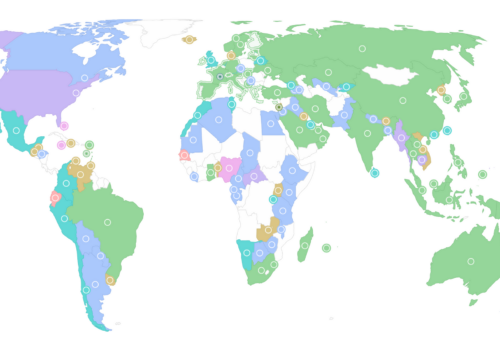eNaira: Same Naira, more possibilities for innovation
Background
On October 25, 2021, Nigeria launched its central bank digital currency (CBDC) — the eNaira. Development began in 2017 with the identification of possible functions. The Central Bank of Nigeria (CBN) then partnered with Bitt, a fintech company based in Barbados, to develop eNaira. The main objectives for developing eNaira were to improve the availability and access to central bank money, support a resilient payments system, encourage financial inclusion, and reduce the cost of processing cash. Furthermore, eNaira aims to enable direct welfare disbursement to Nigerian citizens, increase the government’s revenue and tax collections, facilitate diaspora remittances, and reduce the cost of cross-border payments.
See how the Nigeria fits into the global development of CBDCs using our flagship CBDC Tracker:
How it Works
The current version of eNaira focuses on person-to-person (P2P) and person-to-business (P2B) transactions through the Speed and the Merchant Wallets respectively. Central Bank Governor Godwin Emefiele announced in October that 500 million eNaira, an equivalent of $1.21 million, had already been minted and a total of 200 million eNaira had been issued to banks.
To set up a Speed Wallet, eNaira currently requires users to enter their phone number, email, and Bank Verification Number (BVN). This means that only those with bank accounts are currently able to use the eNaira. After an email verification, users are able to use the wallet in tandem with online banking apps. To load the wallet with eNaira, users log on to their personal banking app and transfer the desired amount to their wallet. Users are then able to send eNaira to anyone with an eNaira wallet by scanning the recipient’s QR code.
As a young global professional at the GeoEconomics Center, my research has focused on the evolution of central bank digital currencies. In November, I traveled to Nigeria, where I had the opportunity to see eNaira in action. In my experience, using eNaira’s Speed Wallet was fairly simple. Once I obtained the necessary information from my personal bank, I was easily able to register for the Speed Wallet, and did not experience any of the issues that were reported during the initial launch of the CBDC, such as technical bugs for new users trying to register.
The CBN announced in December of 2021, it has recorded 583,000 personal wallets and 83,000 Merchant Wallets with total transactions amounting to N188 million, or $500,000. The central bank could do more to increase the adoption of eNaira in a country with over 200 million people and an annual GDP of nearly $500 billion; particularly if President Mohammadu Buhari hopes to use eNaira to increase Nigeria’s GDP by $29 billion over the next 10 years.
The government should continue to work with private banks to encourage their customers to transition from a mobile payment transfer system to an eNaira wallet. In addition, the Speed Wallet needs to be further developed to facilitate diaspora remittances. The ability to send money directly from foreign to Nigerian bank accounts would encourage more Nigerians to use eNaira. The central bank should also focus on integrating the Speed Wallet and personal banking, so that users could load their Speed Wallet with eNaira without accessing their personal banking app. Having to switch between two apps is the most tedious part of using eNaira so fixing this would make the app more user friendly.
Financial Inclusion
The Central Bank of Nigeria adopted the National Financial Inclusion Strategy in 2012, with the primary goal of increasing Nigerians’ access to financial services from 36% in 2012, to 80% in 2020. However, Nigeria fell short of this goal. The EFinA’s Access to Financial Services in Nigeria 2020 Survey indicated that the country had reached a financial inclusion rate of 64% by the end of 2020. The remaining 36% — equivalent to over 38 million adults — still do not have access to banking services. CBN’s Annual Financial Inclusion Strategy Report identified “women, youth, rural dwellers Micro-, Small and Medium-sized Enterprises (MSMEs) and Northern Nigeria” as the most disproportionately excluded demographics. Widespread use of the eNaira could promote financial inclusion in Nigeria by making banking services easily accessible to these excluded groups. Recently, the CBN reported that northern states, primarily Borno, Sokoto, and Gombe, are leading in CBDC adoption ahead of Lagos, a center for economic activity in Nigeria. If this continues, Nigeria’s CBDC could aid in closing the country’s regional gap in access to financial services.
Cash remains the dominant form of transaction in Nigeria, especially for financially excluded groups who are less likely to have access to banking services. However in recent years the payment landscape in Nigeria has evolved and continues to do so. In 2019, digital payments were valued at close to 109 trillion naira, up from only 4 trillion in 2012, when the National Financial Inclusion Strategy was announced. The next phase of eNaira will allow people to register for the Speed Wallet with just their National Identification Number (NIN), thereby facilitating financial inclusion where the current digital payments infrastructure falls short. Therefore, Nigerians without bank accounts and a Bank Verification Number (BVN) would be able to send and receive eNaira.
The CBN hopes to achieve this, along with offline use for eNaira, through the use of Unstructured Supplementary Service Data (USSD) short codes, which would allow users without a strong internet connection and smartphones to use the CBDC. The CBN is also considering making eNaira a payment gateway, technology used by merchants to accept customers’ debit or credit card payments, in order to facilitate wider adoption of the CBDC. If the central bank is able to implement the changes that it has outlined, it could dramatically change the outlook of Nigeria’s financial inclusion strategy.
Naomi Aladekoba is a project assistant with the GeoEconomics Center focusing on Sub-Saharan Africa, Chinese foreign policy, and international development.

At the intersection of economics, finance, and foreign policy, the GeoEconomics Center is a translation hub with the goal of helping shape a better global economic future.
Image: NGN. Nigerian currency. Nigerian banknotes background. Nigerian money. Finance, business background. Perfect for news, reportage

